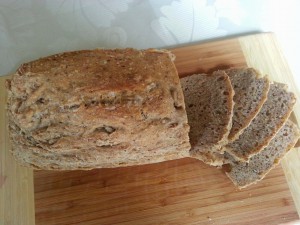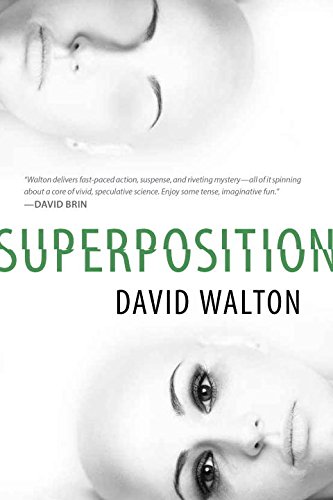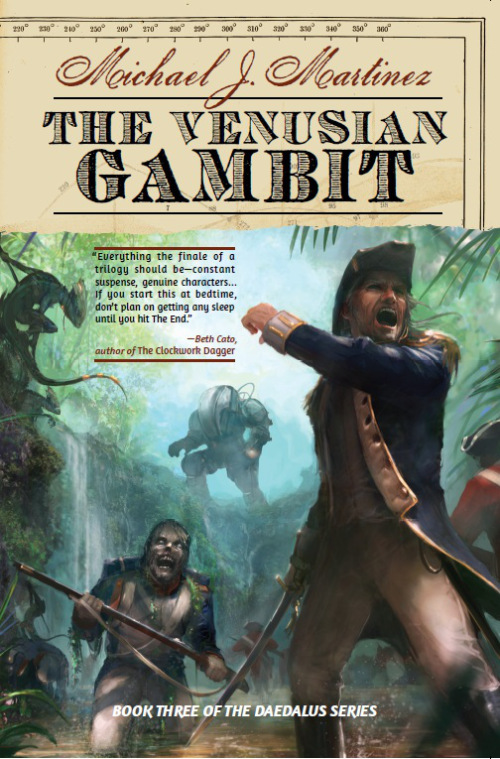Elevengeddon!
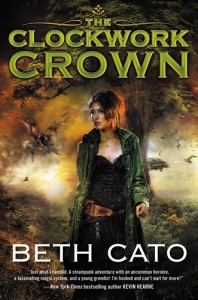 On Wednesday,
On Wednesday, eleven seventeen authors unite to sign books and generally goof off in advance of Phoenix Comicon. The big event happens at The Poisoned Pen Bookstore in Scottsdale, Arizona at 7pm. The Clockwork Crown will be on sale for the first time! Check out the full line-up in snazzy alphabetical order:
Stephen Blackmoore
Beth Cato
Wes Chu
Myke Cole
Delilah S. Dawson
Kevin Hearne
Jason Hough
Richard Kadrey
Michael Martinez
Brian McClellan
Naomi Novik
Andrea Phillips
Cherie Priest
Brian Staveley
Sam Sykes
Chuck Wendig
Django Wexler
If you’re not able to come, fear not! (Or maybe you should fear?) You can order books through Poisoned Pen and have them autographed and shipped to you!
Read MoreAn interview with Josh Vogt
Today I welcome author Josh Vogt. He has two very different novels releasing soon–when he debuts, he debuts with style! Be sure to check out his website, too, as he has created a phenomenal resource for writers at any stage in the process.
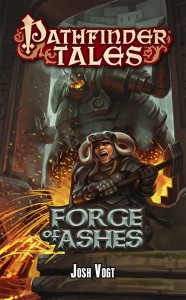 – Your debut novel is set in the Pathfinder world. What was that submission process like?
– Your debut novel is set in the Pathfinder world. What was that submission process like?
I started out simply wanting to get involved with RPG writing, so, after having some pro sales, I sent samples around to various game developers and publishers. James Sutter, Paizo’s head editor, liked my work and ended up buying a couple short stories from me: The Weeping Blade and Hunter’s Folly. After that, he asked if I wanted to pitch a novel, which involved a pretty in-depth outlining and approval process—but it all worked out in the end!
– How much reading and research was involved to ground you in Pathfinder?
I read at least 15 of the other Pathfinder Tales novels, partly to figure out what other authors had been doing in that world. I also scoured dozens of manuals and supplement guides to give myself a firm base. Since I’ve been a gamer most of my life, I was already somewhat familiar with the setting, but I definitely had to brush up in a lot of areas. Fortunately, James was quite helpful in offering suggestions if I ever got stuck on a particular plot point.
– What’s FORGE OF ASHES about?
It focuses on Akina, a dwarven barbarian who returns to her mountain home after fighting abroad for a decade. But when she discovers her family has been disgraced and her mother has disappeared into the deadly tunnels beneath the city, she sets out to find out what really happened in her absence–which crosses her path with plenty of monsters, magic, and mayhem!
– I love that your main character is a female dwarf. Was writing that perspective as fun and intriguing as it sounds?
Absolutely! I enjoyed exploring dwarven culture through her eyes, since she’s a bit of an outsider in her own home when she returns. People have certain expectations of her, or expect her to act a certain way given her instinctively violent nature, but it was fun to discover the other facets of her character beyond the fight scenes and usual dwarven stereotypes.
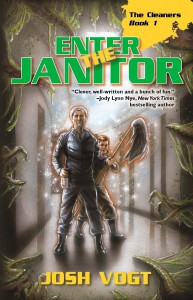 – Now, you have quite a year ahead as you also have two novels forthcoming from WordFire Press. Can you share more about the first book that comes out in May? Is it set on Earth?
– Now, you have quite a year ahead as you also have two novels forthcoming from WordFire Press. Can you share more about the first book that comes out in May? Is it set on Earth?
It is on Earth, yes. The title is Enter the Janitor, and it’s the first book in my dark humor urban fantasy series, The Cleaners. In Enter the Janitor, Ben is a janitor who works for a supernatural sanitation company that keeps the world clean and safe from “Scum.” His latest job involves tracking down an imbalance between Purity and Corruption that could wipe out whole cities while also keeping his new, germaphobic apprentice alive.
– “Supernatural sanitation.” I can’t help but grin when I read that. What inspired this?
It was one of those little “mind shifts” I occasionally have when brainstorming new ideas. I read a lot of urban fantasy, where you’ve got wizards as detectives or secret societies of occult government agents and whatnot. But then I wondered what if a wizard or mage took a different career path…as a janitor or maid or plumber? They could easily infiltrate almost all of society, protect us from magical threats behind-the-scenes, and still have their staffs and wands in the form of mops and squeegees. Once I got to thinking about it, everything fit quite naturally.
– What’s an average work day like for someone in the supernatural sanitation field? I hope they make more than minimum wage…
There is actually a good deal of grunt work for your average Cleaners employee. They keep up the appearance of normalcy by tending to public bathrooms or providing in-home maid services, all the while alert for threats from Scum and other nasties that want to corrupt the world and everyone in it.
– Do you have preorder links for your books? Please share!
Sure thing! Here are two for Forge of Ashes at Paizo and on Amazon.
Enter the Janitor will have preorder links soon!
– You have a fantastic collection of helpful links in your Writer’s Toolbox. What is some of your favorite advice for writers who are just starting out?
Don’t stall out on any one project. Get your story written, even if it’s not the best first draft. Then, as you revise and polish that draft, start also working on the next story. Always be moving forward so you don’t get stuck with an unfinished manuscript that just gets the first few chapters reworked every so often.
– I have to ask… what is your favorite type of cookie?
Mint chocolate flavored of any size or shape!
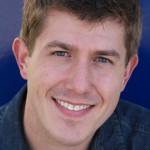 – Is there anything else you want to add?
– Is there anything else you want to add?
Sure! I’ve got a little YouTube channel I’ve been slowly, but steadily fleshing out with videos from various events, conventions, or just me talking about the writing adventure I’m on. Folks can often find news and updates there, plus snippets of panels or presentations I’ve done.
– Thanks for dropping by, Josh!
About my guest: Josh Vogt has been published in dozens of genre markets with work ranging from flash fiction to short stories to doorstopper novels that cover fantasy, science fiction, horror, humor, pulp, and more. His debut fantasy novel, Forge of Ashes, adds to the RPG Pathfinder Tales tie-in line. WordFire Press is also launching his urban fantasy series, The Cleaners, with Enter the Janitor (2015) and The Maids of Wrath (2016). You can find him at JRVogt.com or on Twitter @JRVogt. He’s a member of SFWA as well as the International Association of Media Tie-In Writers.
Read MoreGuest post: M. Darusha Wehm with Books and Bread
I’m excited to host M. Darusha Wehm as a guest today. She’s the author of Children of Arkadia from Bundoran Press, just released on April 28th, but she’s not just here to talk books. Oh no. She’s here with a BREAD RECIPE. I’ll let Darusha say it best…
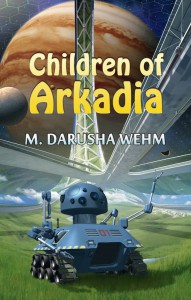 Children of Arkadia follows three generations of humans and AIs participating in an audacious experiment — to create a just and free society in an orbital space colony. The book is, in many ways, utopian science fiction. The Arkadians are literally trying to build a better world. Of course, it’s not that simple, and this story revolves around how people can (or can’t) resolve the inherent conflict between competing views of what doing the right thing actually entails. And, of course, how they are going to feed themselves.
Children of Arkadia follows three generations of humans and AIs participating in an audacious experiment — to create a just and free society in an orbital space colony. The book is, in many ways, utopian science fiction. The Arkadians are literally trying to build a better world. Of course, it’s not that simple, and this story revolves around how people can (or can’t) resolve the inherent conflict between competing views of what doing the right thing actually entails. And, of course, how they are going to feed themselves.
Arkadia is a mix of high-tech and rural living. Farming is the chief concern of most of the people — human and AI — and even those not directly participating in growing food are, to some extent or another, foodies. Among the human population, at least, everyone needs to eat.
There is no commerce on Arkadia, but there is trade. Chen Wu is one of Arkadia’s volunteer bakers and he doesn’t think of himself as lazy — he’s efficient. He makes a lot of bread, so he does it the easy way: by letting time do the work.
Ingredients
4 cups flour
1 tsp salt
1/2 tsp yeast
2 cups water
1/2 cup seeds (flax, sunflower, chia, sesame, whatever)
Instructions
Add all the dry ingredients to a large bowl and stir them up.
Add 2 cups of warm water, mix until you get a damp, doughy ball. You can do this all with a wooden spoon, there’s no need to knead! Cover with a cloth and let it sit overnight.
The next day, pour the dough into a loaf pan and bake at 220C/425F for 40-60 minutes.
This seed loaf is my real-life everyday bread, using 3 cups of white flour, 1 cup of whole wheat and flax seed or meal. I’ve let the dough sit for more than 24 hours and as little as 8 hours. Longer is better, but the bread has always turned out.
You can use more or fewer seeds; I wouldn’t go with more than a cup, though.
This recipe is based on Jim Lahey’s No-Work Bread, from How To Cook Everything.
Bio:
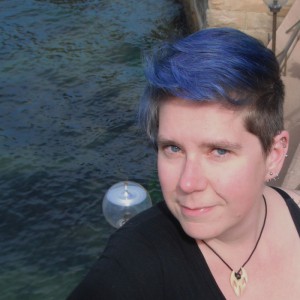 M. Darusha Wehm is the three-time Parsec Award shortlisted author of the novels Beautiful Red, Self Made, Act of Will and The Beauty of Our Weapons. Her next novel, Children of Arkadia (Bundoran Press), will be released April 28, 2015. She is the editor of the crime and mystery magazine Plan B.
M. Darusha Wehm is the three-time Parsec Award shortlisted author of the novels Beautiful Red, Self Made, Act of Will and The Beauty of Our Weapons. Her next novel, Children of Arkadia (Bundoran Press), will be released April 28, 2015. She is the editor of the crime and mystery magazine Plan B.
She is from Canada, but currently lives in Wellington, New Zealand after spending the past several years traveling at sea on her sailboat. For more information, visit http://darusha.ca.
Publisher’s Blurb:
Children of Arkadia
Kaus wants nothing more than to be loved while its human counterpart, Raj Patel, believes fervently in freedom. Arkadia, one of four space stations circling Jupiter, was to be a refuge for all who fought the corrupt systems of old Earth, a haven where both humans and Artificial Intelligences could be happy and free. But the old prejudices and desires are still at play and, no matter how well-meaning its citizens, the children of Arkadia have tough compromises to make.
When the future of humanity is at stake, which will prove more powerful: freedom or happiness? What sacrifices will Kaus, Raj, and the rest of Arkadia’s residents have to make to survive?
For more information, click here or go directly to Amazon to order.
Read MoreAn Interview with Steve Bein, author of DISCIPLE OF THE WIND
Today I welcome guest author Steve Bein. He’s a regular contributor to the neo-novelist group Novelocity, of which I’m webmistress. His third book from Roc just came out. Here’s more about Disciple of the Wind:
When Tokyo falls victim to a deadly terrorist attack, Mariko Oshiro knows who is responsible, even though she doesn’t have proof. She pleads with her commanding officers to arrest the perpetrator, an insane zealot who was just released from police custody. When her pleas fall on deaf ears, she loses her temper and then her badge, as well as her best chance of fighting back.
Left on her own, Mariko must work outside the system to stop a terrorist mastermind, armed with only her cunning and her famed Inazuma blade. But going rogue draws the attention of an underground syndicate that has been controlling Japanese politics from the shadows for centuries. They are the Wind, and they have a penchant for mystical relics—relics like Mariko’s own sword, and the iron demon mask whose evil curse is bound to the blade. Now the Wind is set on acquiring Mariko.
Mariko is left with a perilous choice: join an illicit insurgency to thwart a deadly villain or remain true to the law. Either way, she cannot escape her sword’s curse. As sure as the blade will bring her to victory, it will eventually destroy her…
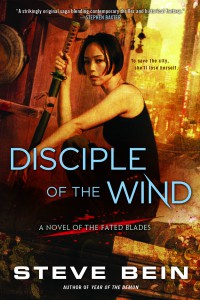 You’re a confessed Japanophile from an early age. What was your favorite cartoon/anime as a kid? Do you have a new favorite now?
You’re a confessed Japanophile from an early age. What was your favorite cartoon/anime as a kid? Do you have a new favorite now?
I can’t say I watch much anime anymore, but my favorite way back when was TranZor Z. The people who created the show would tell you it’s about a giant robot who defends the Earth from giant aliens, but to me it was about the kid who pilots the robot. He had this hovercraft that also served as TranZor Z’s brain. The same animated sequence shows up in every episode: the kid leaves home in the hovercraft, docks it in the robot’s cranium, and brings TranZor Z to life. I thought that was the coolest thing ever.
I like standard urban fantasy novels, but one thing I really liked about Mariko was that she grew a lot through her bond with her addict sister rather than through a romance. Did you decide to go that route from an early stage?
Yes. I don’t read romance, so I don’t really know how to write romance. But more importantly, I don’t like seeing female characters defined by their function as half of a couple. That’s not because of some well-articulated feminist stance (though I do have one of those); it’s because I don’t find those women interesting to read about. Mariko kicks ass because I like reading about ass-kickers. She doesn’t need a boyfriend to rescue and she definitely doesn’t need a boyfriend to rescue her.
Some reviewers of Year of the Demon had an observation along similar lines: when Mariko gets promoted to Narcotics, she gets a partner, and apparently everyone expected Mariko and Han (her partner) to hook up. I think that’s bizarre. Why can’t a man and a woman just be buddies? When did it become the rule that if they trust each other and confide in each other, the next step is inevitably a kiss? I just don’t get it.
I confess, I loved the entire Daughter of the Sword (the first book), but the historical parts (Glorious Victory Unsought and Tiger on the Mountain) were my favorites. Have you written/considered writing pure historical fiction?
Absolutely. There are so many episodes in Japanese history that demand my attention. The Mongol invasions don’t need any fantasy element; these people had grenades, rocketry, and primitive tanks. Takeda Shingen is one of the baddest badasses ever to walk the earth; he deserves a novel all to himself. Some day I’d like to write those books. The only question is when.
The Fated Blades series obviously involved heavy duty research and plotting. Did you outline the full arc from the start? How did it develop?
I wrote Daughter of the Sword as a standalone, and spent years submitting it to agents and seeing it rejected. (I don’t take that personally; it’s a genre-bending book, and genre-benders aren’t the easiest to sell.) When I finally signed an agent, we got an offer from Roc right away, and they asked if I could write a sequel. The correct answer to that question is yes, regardless of whether or not it’s true.
Having said yes, I had to figure out how to write the next one, and I discovered that I’d accidentally laid the perfect foundation for a series. Mariko’s a cop, and there will never be an end to police stories. Interwoven with Mariko’s story are all the historical set pieces, and I’d already set aside nine hundred years’ worth of history to work with. I had two bottomless wells to draw from, so I was all set.
What martial arts do you practice?
These days it’s exclusively Brazilian jiujitsu, but I came up in a Jeet Kune Do system. That’s the art Bruce Lee founded, designed for street self-defense. I’ve dabbled in a bunch of other arts too (I think the last count was 25), including several sword arts, which obviously inform these books quite a bit.
There is one moment in a fight scene that’s directly lifted from my own experience. In Japan I trained jiujitsu with a former sumo wrestler. Let me tell you, once that guy got on top of you, there was no getting out. In Daughter of the Sword, I have an ex-sumo wrestler tackle Mariko, leaving her feeling as helpless as I felt.
If a history nut like me wants to learn more about samurai, what are a few books (fiction or nonfiction) you would recommend?
The first one I read is still my favorite: Secrets of the Samurai by Adele Westbrook and Oscar Ratti. Stephen Turnbull’s The Samurai is another excellent choice, and after you read that, read William Wayne Farris’s Heavenly Warriors as a counterpoint to Turnbull.
You can also go to the primary texts. The most famous one is Miyamoto Musashi’s Book of Five Rings. I like the Hagakure better; it’s the compiled sayings of a veteran samurai recorded by a young samurai who wants to better understand bushidō. There are also English translations of Yagyū Munenori, a samurai with a keen interest in Zen. His school of swordsmanship still exists, actually, which I think is pretty cool.
Your third Fated Blades novel, Disciple of the Wind, just came out, but can you also tell us about your new novella?
It’s called Streaming Dawn, and it takes place between Year of the Demon and Disciple of the Wind. It’s a tale of politics and intrigue, honor and dishonor, fabled swords and ninja badassery. It also introduces the most sinister of the Inazuma blades, a dagger known as Streaming Dawn. It’s written as a standalone novella, so for anyone who hasn’t read the books it’s a perfect entry point to the saga of the Fated Blades. People who already know the novels will enjoy discovering the backstory of Mariko’s famed sword, Glorious Victory Unsought, and they’ll recognize some beloved characters: the warlord Toyotomi Hideyoshi, Daigoro’s legendary father, Okuma Tetsurō, and everyone’s favorite one-handed pearl diver, Kaida.
Thanks, Steve!
More about my guest:
Steve Bein (pronounced “Bine”) is a philosopher, photographer, traveler, translator, martial artist, and award-winning author of science fiction and fantasy. His short fiction has appeared in Asimov’s, Interzone, Writers of the Future, and in international translation. His first novel, Daughter of the Sword, was met with critical acclaim, and his second novel, Year of the Demon, was named one of the top five fantasy novels of 2013 by Library Journal. Steve’s newest book, Disciple of the Wind is in stores now, and his new novella, Streaming Dawn, is available now for your e-reader. You can find his work at Powell’s, Barnes & Noble, Amazon, and Audible.
Steve teaches philosophy at Texas State University. He lives in Austin with his partner Michele and their Lab, Kane. You can keep up with him online at facebook/philosofiction, @AllBeinMyself, and http://www.philosofiction.com.
Read MoreGuest post from David Walton: WHAT’S THE BEST WAY TO PUBLISH MY BOOK?
Today I welcome author David Walton to the blog. His book Superposition is out from Pyr today–be sure to check it out!
WHAT’S THE BEST WAY TO PUBLISH MY BOOK?
There are so many choices these days! Submit your book to a big NY publisher? Try a small press? Publish yourself? Each of these choices have their pros and cons, depending on what you’re looking for. And I’ve tried all three.
My first novel, TERMINAL MIND, was published through a small press. The second, QUINTESSENCE, was a hardcover release with Tor Books. My third, QUINTESSENCE SKY (the sequel to the Tor release), I self-published. I have only one experience with each so far, so your mileage my vary, but I can tell you what I’ve experienced, and what I’ve learned from the journey so far.1. SMALL PRESS. The best part of working with a small press was the very small number of people involved (two!), each of whom was totally devoted to my book and making it succeed. They cared about my opinion and worked very hard on the book. Unfortunately, they didn’t have a very wide reach. They couldn’t get Terminal Mind in bookstores (for the most part), and even when it won the Philip K. Dick Award that year, not many people knew about it. All in all, however, this was a great experience, and I have no complaints.
2. BIG PRESS. The best part of working with a big press is that it’s big! Everyone has heard of Tor, which means credibility, a bigger advance, and national bookstore distribution. Tor made Quintessence into a beautiful hardcover, and I thought my career was made. Unfortunately, although the book sold a lot more out of the gate than Terminal Mind did, it wasn’t very much by Tor’s standards. It didn’t earn out its advance, and they declined to pick up the sequel. Still and all, an exciting experience that has done a lot to establish my name in the genre and spread awareness of my books.
3. SELF-PUBLISHING. Self-publishing has been an adventure. I approached it differently than many authors do: instead of hiring people to produce the cover art, cover design, interior layout, e-book format, etc., I decided to do it all myself. As a result, it cost me practically nothing to produce Quintessence Sky, though it took a lot of learning and a lot of work. I think the result is quite attractive–not entirely up to Tor’s standards, perhaps, but certainly as good as many small press books. The great thing about self-publishing is that I own it. All the profits come to me, I can run special sales and promotions whenever I like, and it will continue to be available forever.
4. MEDIUM PRESS. What, you say? A fourth option? I thought you were talking about three! We often talk of three categories, but really there’s a whole spectrum. There are not-quite-so-big publishers, and medium publishers, and small publishers, and quite tiny publishers. My fourth and fifth books, SUPERPOSITION and SUPERSYMMETRY, will be published by Pyr Books in April and September. Pyr could be considered a big press–they have national bookstore distribution through Penguin Random House, and they publish a good number of books each year. My experience there so far has been extremely positive: they have the personal enthusiasm and attention of a small press, but the reach and publicity of a larger one.
So… which option is best for you? The answer depends on what you want. None of them are easy roads. None of them is a sure bet for making money. The question is, where do you want the difficulty to be?
If you try for a big publisher, the difficult part will be getting published at all. The competition is fierce, and books are relatively few. If you are published, the difficulties may come in retaining control over your work. What you get in return for these difficulties are the credibility and visibility of a big house, and a crew of smart and professional people to help you succeed.
If you self-publish, the difficult part will be in finding readers. Getting published is easy, and you’ll have complete control over your work. But you won’t have run the gauntlet of agents and editors, and so no one will know if your work is any good or not. It will be difficult to convince them to give it a try. You will also have to do all the work yourself, or pay someone to do so.
There are many options along the spectrum between those two extremes. The best way to publish your book is the way that works for you. Like me, it may even be a different way for each book! May you find success in one or the other, or in the many options that land somewhere in between.
—-
David Walton is the author of the newly released novel SUPERPOSITION, a quantum physics murder mystery with the same mind-bending, breathless action as films like INCEPTION and MINORITY REPORT. His other works include the Philip K. Dick Award-winning TERMINAL MIND, the historical fantasy QUINTESSENCE (Tor, 2013) and its sequel, QUINTESSENCE SKY. He’s also a Lockheed Martin engineer and the father of seven children. You can read about his books and life at http://www.davidwaltonfiction.com/.
Read MoreBlurby Goodness
I’m a writer, but foremost I’m a reader. That means I go into total fangirl mode for certain authors and series. I heard a lot of buzz a few years ago at the release of Michael J. Martinez’s first book The Daedalus Incident. It sounded like my kind of book: a human settlement on Mars where things so inexplicably weird, and a parallel plot with a colonial British Empire with space-faring, alchemy-powered frigates. Um, hello. Science fiction AND historical fantasy in one book? Yes, please!
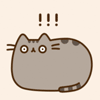
I loved the book and raved about it and loved the second one just as much. Meanwhile, I kept up with Michael via Twitter. We were able to meet and chat at World Fantasy in D.C. last November, and he asked if I’d be willing to read the third book to perhaps blurb it.
I loved The Venusian Gambit. It was a nonstop, can’t-stop-reading, oh-good-grief-is-everyone-gonna-die kind of book. I was happy to send along a blurb, and I was genuinely shocked this week to find it’s going to be featured on the book’s cover!
I’m chuffed. No denying it.
You can read Michael’s full cover reveal post over here, and be sure to check out the first book of the trilogy, The Daedalus Incident. Go ahead and blame me when you’re still up and reading at 1am, too. (And hey, Michael is attending Phoenix Comicon at the end of May! Get those books signed.)
Read More



